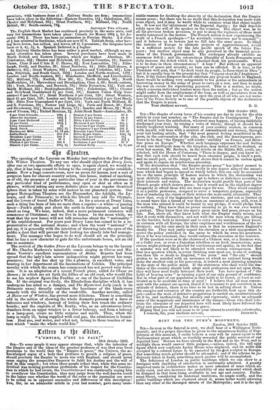18th October 1862.
Sat—The thanks of every lover of his country are due to you for the able article in your last number, on " The Empire and its Contingencies." You will at least have the satisfaction, whatever may happen, of having faithfully discharged your duty, by raising a voice of timely, though it should be a fatally neglected warning. But many of your country readers, in common with myself, will hear with a mixture of astonishment and dismay, through your last leading article, that " the most general feeling manifested in the press, in the conversation of the city, the club, and the drawingroom, pro- fesses to be that 'the Empire' will confer 'stability' on France, and there- fore peace on Europe." Whether such language expresses the real feeling of any one intelligent man in the kingdom, may indeed well be doubted, as even last session, Mr. Roebuck, in the debate on the Militia Bill, could, un- rebuked, tell the House of Commons, "There is danger, and you know it But that such talk should be heard from educated people, is itself a part, and no small part, of the danger, and shows that it cannot be useless again and again to expose its mischievous absurdity.
If the declaration that "the Empire means peace" has indeed seemed to warrant such a persuasion, and has really in any degree allayed the uneasi- ness which had begun to spread so widely before, this can only be accounted for on the same principle of human nature to which the declaration was most skilfully addressed. Men are apt to believe or disbelieve according to their interests and wishes. The declaration would gratify that part of the French people which desires peace; but it would not in the slightest degree disappoint or offend those who are most eager for war. They would consider it as a politic profession, designed to serve a temporary purpose, especially that of rendering the object of their wishes the more easily attainable. They know that, even if the declaration had been absolute, and not so limited as to sound more like a threat of war than an assurance of peace, still, even if the man who uttered it could be bound by any pledge, it would pledge him to nothing. They know that no power meaning to go to war ever wanted a pretext. They know that the man's great uncle had peace always on his lips. But, above all, they know both what the Empire really means, and that it rests with themselves, and not with the man whom they are lifting on the buckler, both to interpret and to carry out its meaning. They know, in common with all Europe, the utter emptiness and worthlessness of the in- dividual; and his only merit in their eyes is that he represents England's deadly foe. They may justly regard his elevation as a tacit engagement to revive the policy embodied in the name to which he owes his greatness. Even if he was reluctant, they would enforce the execution of the contract, If the question were as to the chances of a Chinese war, or a Burmese war, or a Caffro war, or even a Canadian rebellion or an Irish insurrection, sonic excuse might perhaps be pleaded for carelessness and apathy, in the fact that a mistake was not likely to be attended with serious consequences. But that in a question which, as every thinking man must see, is one of nothing less than life or death to England, " the press " and " the city " should profess to be satisfied with an assurance on which no rational being would stake the smallest coin in' his possession, is indeed a most alarming symptom in the state of the public mind. If the statesmen who shall wield the des- tinies of the country should both adopt such professions and act upon them, they will have most foully betrayed their trust. You have spoken of " the habit of bearing arms " as forming a part of our only ground of confidence. But in what part of our population is that habit to be found, at least so cul- tivated as to be available in time of need ? I believe that all men conver- sant with the subject are agreed, that if it is necessary to put ourselves in an attitude of defence, there is no time to be lost in setting about it. Unless the energies and resources of the country are forthwith bent upon this ob- ject—unleas the work of defensive preparation is carried on, unostentatiously let it be, and inoffensively, but steadily and vigorously, under an adequate sense of the magnitude and imminence of the danger—those who shall cele- brate the obsequies of our departed hero will moat likely have followed the glory and greatness of England to the grave.
Hoping that you will not cease to do your utmost to avert this catastrophe,
I remain, Sir, your obedient servant, IRENyaus.


























 Previous page
Previous page